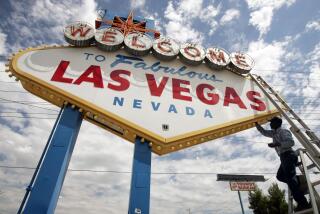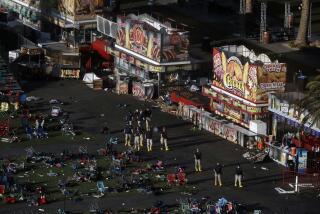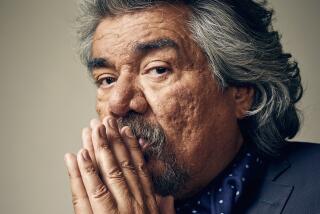In Las Vegas, the casino is always watching ‚ÄĒ and yet it missed Stephen Paddock
Reporting from Las Vegas ‚ÄĒ The casino hotels on the Las Vegas Strip, with all their glitzy delights, aren‚Äôt just palaces of distraction. They‚Äôre miniature surveillance states.
A typical facility might be armed with thousands of cameras, which watch gamblers as they enter, while they play and when they leave. The footage is stored as potential evidence and monitored by internal security forces who are prepared to dispatch a response within moments in case of problems.
‚ÄúIn Vegas, everybody‚Äôs gotta watch everybody else,‚ÄĚ Robert De Niro said in the 1995 drama ‚ÄúCasino.‚ÄĚ Dealers watch the players, pit bosses watch the people watching the dealers, and the ‚Äúeye in the sky‚ÄĚ ‚ÄĒ the camera ‚ÄĒ watches over all.
The thought of beating that eye in the sky has inspired a generation of glam heist movies, starting with ‚ÄúOcean‚Äôs 11.‚ÄĚ
But now, questions are mounting over a very different type of crime than the grifting and grabbing scams Vegas has always been obsessed with ‚ÄĒ the mass shooting mounted on Oct. 1 from the 32nd floor of the Mandalay Bay Resort and Casino.
It turns out, one place the casino’s cameras don’t have eyes is the network of hallways inside the Mandalay Bay hotel. That’s where gunman Stephen Paddock, 64, of Mesquite, Nev., shot a Mandalay Bay security guard, Jesus Campos, at 9:59 p.m., about six minutes before Paddock started firing at a crowd of thousands of concertgoers gathered below, an attack that killed 58 people and injured nearly 500 others.
As precious minutes ticked by, and Paddock turned his attention to aiming a barrage of rapid-pace gunfire at the crowd, it was not until 10:17 p.m. that police were able to pinpoint Paddock’s location and arrive on the floor where he mounted the attack. But they were too late. The damage had been done. For reasons that remain unknown, Paddock had already stopped his attack.
Where was hotel security?
Both the police and hotel management have declined to answer questions about whether the hotel informed police that the security guard had been shot. And representatives of the victims are already asking questions.
‚ÄúGet your iPhone, put it on the timer,‚ÄĚ said Chad Pinkerton, a Houston-based lawyer representing a 21-year-old shooting victim in the first of what are expected to be many lawsuits. ‚ÄúRun six minutes. See how long it is. I‚Äôve done it. It‚Äôs a long time.‚ÄĚ
For much of the 20th century, casino security was visible and personal. Guards walked on catwalks overlooking the playing tables and the gamblers, keeping their eyes on the tremendous amount of cash and chips flowing through the business on a daily basis ‚ÄĒ a rich target, literally.
‚ÄúBack in the day, security was armed,‚ÄĚ said George Joseph, president of World Casino Consulting and a former director of surveillance at Bally‚Äôs. ‚ÄúNow they have less personnel who are carrying firearms, simply because of the liability issues. In the day, we would chase somebody down‚Ķ. Now, you‚Äôre worried if he starts running and knocks over a customer, a little old lady playing a slot machine, you‚Äôre liable.‚ÄĚ
Today, casino heists are rare, but not unheard of. In 2010, a thief at the Bellagio swiped $1.5 million in casino chips, including $25,000 chips known as ‚Äúcranberries,‚ÄĚ and sped off on a motorcycle.
Back in the day, security was armed. Now they have less personnel who are carrying firearms, simply because of the liability issues.
— George Joseph, president of World Casino Consulting
In March, a group of well-dressed men in masks mounted a smash-and-grab robbery at the Bellagio’s high-end jewelry store, leading to a massive armed response by Vegas police. Guests rushed outside amid fears of an active shooter.
Casinos have spent decades perfecting their security against such events.
Casinos like Mandalay Bay ‚Äúspend millions and millions of dollars on security,‚ÄĚ said a surveillance expert who helped install an early version of Mandalay Bay‚Äôs security systems after it opened in the 1990s. The system he installed had close to 1,200 cameras, and he guesses Mandalay Bay has about 3,000 cameras now.
‚ÄúThey‚Äôre all recording 24/7. Anybody who walks through that door is an asset. They‚Äôre going to take care of their assets,‚ÄĚ said the expert, who declined to be identified because of concerns of future litigation.
But hallways can be difficult for security cameras to capture ‚ÄĒ they might be too long or too dark to show what‚Äôs actually happening ‚ÄĒ so hotels instead put cameras on bottlenecks like elevator banks. ‚ÄúTypically they want to see who‚Äôs coming onto the floor and off the floor, and they can tell now who goes into rooms with the keycards,‚ÄĚ the expert said.
The biggest threat to the casinos’ operations today, the one security personnel are trained to be watchful for, appears to be personal-injury lawsuits.
In 10 years at Bally‚Äôs, ‚Äúwe saved more money on liability claims than we ever did on table game cheating,‚ÄĚ said Joseph, noting that casino footage became an important way to fight personal-injury lawsuits inside the building.
One of the public’s few windows into Paddock’s history in casinos comes from a slip-and-fall lawsuit that Paddock filed against the Cosmopolitan Hotel in 2012. And yes, there was video of Paddock’s fall.
Paddock lost the lawsuit in arbitration largely because the footage showed other customers passing the area without any problems. The house, and its surveillance system, won.
Yet while Paddock‚Äôs extensive time in Las Vegas as an avid gambler ‚ÄĒ which would make him probably one of the most visually surveilled people on Earth ‚ÄĒ has given investigators a massive amount of evidence to sort through, little of it has apparently been fruitful in helping establish a motive.
Clark County Sheriff Joe Lombardo said investigators had compiled 200 ‚Äúinstances‚ÄĚ of Paddock moving around Las Vegas before the attack, but he was always alone.
Some critics have also wondered why hotel security did not notice Paddock bringing in at least 10 suitcases filled with guns into his hotel suite.
‚ÄúIt will be very important to look at the training for the security guards in the hotel who were there in the five days before,‚ÄĚ said Mo Aziz, another attorney representing a California victim, Paige Gasper.
Before Paddock’s shooting rampage began at 10:05 p.m., Campos radioed and called security on a hotel phone about a gunman in the building, Clark County Assistant Sheriff Tom Roberts said this week. Officers were already in the building on a different call.
Yet as Paddock rained bullets down on the crowd for 10 minutes, police audio dispatches revealed widespread confusion among officers at the scene, who had not received Campos’ alert and were urgently trying to figure out where the gunfire was coming from.
The officers who did zero in on Mandalay Bay did not immediately know where Paddock was, and had begun their search on the floor below him. ‚ÄúI‚Äôm inside the Mandalay Bay on the 31st floor,‚ÄĚ one officer radioed about 10:14 p.m. ‚ÄúI can hear the automatic fire coming from one floor ahead. One floor above us.‚ÄĚ
According to police, the first officers arrived on the 32nd floor at 10:17 p.m. ‚ÄĒ two minutes after Paddock had stopped firing. Campos was there waiting for them. ‚ÄúThey weren‚Äôt aware of him being shot until they met him in the hallway after exiting the elevator,‚ÄĚ Lombardo said Monday.
Roberts also revealed this week that the hotel had dispatched its own armed security team, which arrived on the 32nd floor about the same time as police.
The lack of cameras in the hallway has made it difficult to nail down a precise timeline of events, and investigators promised an updated timeline on Friday.
Experts on security say the normal protocol for casinos is to call police immediately for help when an armed threat presents itself.
‚ÄúCasinos call 911 like everyone else,‚ÄĚ said C. David Shepherd, a former FBI special agent who spent seven years as executive director of security for the Venetian Resort Hotel and Casino. While the casinos have armed security, ‚Äúthey are not protected and trained to take on a barricaded suspect. It takes a special trained team of police officers.‚ÄĚ
William Sousa, a criminal justice professor at the University of Nevada, Las Vegas, said police were called in for a wide range of crimes.
‚ÄúYou‚Äôll see a lot of coordination between the private security forces and police, and the Strip properties frequently meet among themselves to coordinate among their security directors,‚ÄĚ Sousa said.
But while security is high, ‚ÄúThere is also a level of inconsistency among the different properties,‚ÄĚ he said. ‚ÄúThere is a fair amount of discretion for the hotels.‚ÄĚ
A former armed security guard at Mandalay Bay expressed confusion over why it took hotel officials and police so long to stop the gunman.
When he worked at the hotel and casino in the early 2000s, he said, all radio calls went through ‚Äúcontrol,‚ÄĚ which is also called dispatch. There were at all times at least three people in the control office: one dispatcher who reports to other units, one dispatcher who watches cameras and a third in charge of calling police when necessary.
‚ÄúIf [Campos] did things the way you‚Äôre trained, you report to control [dispatch] through your daily issued radio, then dispatch makes the call to the authorities, only because they‚Äôre in a safe place in the basements,‚ÄĚ said the former guard, who spoke on condition of anonymity because he was not allowed to discuss security issues.
He added: ‚ÄúIn a shooting situation you would first seek shelter, and call for help, meaning you radio the security office, who then types the type of incident, time of incident, and another person calls authorities and gives as much information as possible.‚ÄĚ
Hotel security, he said, is supposed to provide the first response, attempting to contain the scene, and possibly evacuate other possible victims if not the whole floor. An alarm system is in place, he said, to inform guests if they need to evacuate.
Training to become a security officer at the hotel took him about one month, and the emphasis, he said, was on avoiding liability. ‚ÄúTheir No. 1 problem is lawsuits; they said most people sue just because they‚Äôre mad or had a bad experience, so never admit guilt, and always try to comfort the complaining guests.‚ÄĚ
Kaleem reported from Las Vegas. Pearce, Etehad and Winton reported from Los Angeles.
ALSO
In the solitary world of video poker, Stephen Paddock knew how to win. Until he didn’t
Las Vegas looks to its new NHL team, the Golden Knights, as an anchor after tragic shooting
More to Read
Sign up for Essential California
The most important California stories and recommendations in your inbox every morning.
You may occasionally receive promotional content from the Los Angeles Times.














